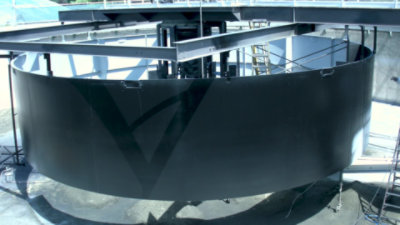What Is Waterline Corrosion? The Importance of Anti-Corrosion Coatings for Pipes
Waterlines and pipes are the backbone of the water and wastewater industry, and ensuring these assets continue working at peak efficiency is essential to daily operations. If waterlines or pipes erode, rust, or are otherwise obstructed due to corrosion, the consequences can be far-reaching—and costly.
If your facility or municipality is looking for ways to prevent underline pipeline or waterline corrosion, a low maintenance and cost-effective solution is to install protective, corrosion resistant coating.

What Is Waterline Corrosion?
Corrosion naturally occurs when steel or concrete pipes or waterlines are exposed to certain chemicals, environmental conditions, or atmospheric elements, commonly occurring when materials are in contact with water.
A common type of corrosion in the water industry is due to oxidation. During the corrosion process, the base material reacts to the difference in oxygen exposure. Parts of the substrate are exposed to higher amounts of oxygen because they are above the waterline, while other parts below the waterline come into contact with less oxygen. The reaction between these areas causes the part of the material submersed in water to become oxidized and have a corrosive reaction. This type of corrosion is commonly found in assets where water is stagnant or at the edge of the waterline, such as pipes, tanks, gutters, pipes, and channels.
Other forms of pipe or waterline corrosion are a result of exposure to certain chemicals, such as hydrogen sulfide (H2S) or other acids.
When corrosion occurs, it can cause significant damage to waterlines and pipes. It weakens the structural integrity, causes leaks and failures, shortens the lifespan of the assets, and can even lead to complete structural failure.
Preventing Waterline & Sewer Pipe Corrosion
There are several methods water industry professionals use to prevent waterline and sewer pipe corrosion.
One approach is to use pipe materials that are not as prone to corrosion as steel or concrete, such as aluminum or stainless steel. Another solution is to apply an anti-corrosion coating to act as a protective barrier around the material.
Across industries, corrosion resistant coatings are the main defense against corrosion. These products are economical, low maintenance, and extremely effective, so it’s no surprise that the use of anti-corrosive coatings for sewer pipes and waterlines continues to grow in popularity among municipalities and water and wastewater facility operators..
How Do Anti-Corrosion Coatings Work?
Anti-corrosive coatings are specially formulated materials that are applied directly to the exterior of the steel or concrete substrate. They create a barrier between the surface and the surrounding environment, acting as a shield to protect the waterline or sewer pipe from corrosive agents, rust, chemical attacks, and more.
These corrosion resistant coatings are designed to slow down or entirely prevent the corrosion process, which not only extends the lifespan of the asset but also prevents the formation of rust in waterlines or sewer pipes.
Common Types of Anti-Corrosion Coatings
Today, there is a wide range of materials used to create anti-corrosion coatings for sewer pipes and water lines, including plastics, synthetic resins, and natural paints. Three of the most commonly used types of coating materials are epoxy, polyurethane, and zinc.
Epoxy
Epoxy coatings create an extremely durable protective layer on the concrete or steel surface of the pipe. This epoxy barrier fully adheres to the substrate and shields it from exposure to substances and environmental elements that cause corrosion, such as chemicals, moisture, abrasion, and ultraviolet (UV) radiation. Liquid epoxy coatings are quick to install, have low maintenance requirements, offer superior chemical resistance, and are long-lasting.
Polyurethane
Anti-corrosive coatings made from polyurethane are designed to provide exceptional resistance to chemicals, UV radiation, impacts, abrasions, and other elements that cause corrosion. Polyurethane is a flexible, strong, long-lasting option that quickly and firmly adheres to the steel or concrete pipe substrate. For extended protection benefits, polyurethane coatings are often used in combination with epoxy.
Zinc
Zinc coatings act as the first line of defense against corrosion. The process involves applying a layer of zinc to the exterior of the concrete or steel pipe surface. This zinc layer will corrode before the substrate does, which leads to an extended service life of the pipe and makes zinc coatings ideal for environments with especially high levels of moisture.
Benefits of Anti-Corrosion Coatings for Pipes & Waterlines
Water or wastewater pipeline systems are at risk of corrosion unless they are coated in a protective, corrosive resistant barrier. An effective anti-corrosion coating will not only protect the metal or concrete substrate from degradation and erosion due to environmental conditions (oxidation, moisture) or exposure to corrosive materials but also prevent leaks, prolong the structural life of the waterline or pipe, and increase the efficiency of the system.
Epoxy and polyurethane coatings also come with additional benefits, such as superior resistance to chemicals, impacts, abrasions, and water. These coating products are impermeable and flexible, making them ideal for pipes, fittings, containers, or lines in wastewater or water facilities.
Choosing the right anti-corrosion coating is an important part of preventing corrosion, maintaining the integrity of the water or wastewater system, and extending the life of the pipe or waterline.


Shop High Performance Anti-Corrosion Coatings at Sherwin-Williams
Sherwin-Williams is the leading provider of coatings and linings for the water and wastewater industry. Our line of high performance transmission pipe coating and lining products offers superior resistance to corrosion, impacts, abrasions, and chemical attacks. With our durable, flexible, and long-lasting lining and coating solutions, you can extend the service life of your water or wastewater infrastructure and experience cost savings for years to come.
Contact a Sherwin-Williams Coatings Specialist today to learn more about our anti-corrosive coating and lining products for water and wastewater pipelines.
Discover More
Industry Expertise and Innovation
See how we help customers find customized solutions for their project and application challenges.


